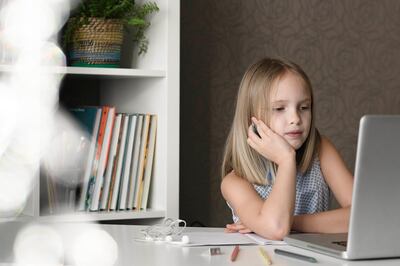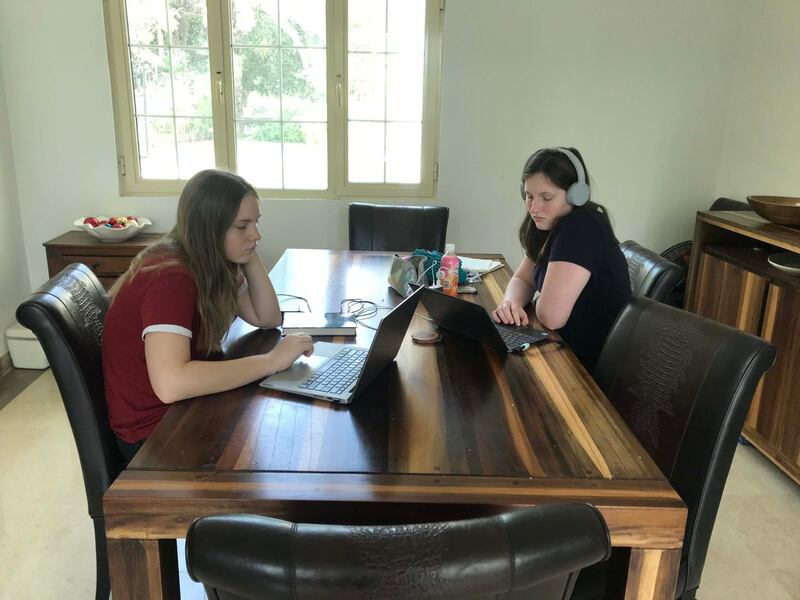Established online schools and home education services have enjoyed a surge in popularity as parents seek out alternatives in the distance learning age.
The coronavirus pandemic forced schools across the Emirates to close their doors and switch to online learning in March.
While many schools have offered fee discounts in light of the change to their offerings, the lower costs of other online resources are attracting interest.
iCademy Middle East, an online school in Dubai, has had a spike in enrolments while homeschooling groups have been inundated with queries from parents curious about how to educate children at home on a more permanent basis.
When schools announced online lessons due to the coronavirus pandemic, Heather Whitehead, a 46-year-old American mother in Dubai, moved her daughters 13-year-old Bethlyn, and 14-year-old Ainsley out of Dubai American Academy and to iCademy Middle East.
“I was skeptical if a brick and mortar school would have classes at all this year. We made this decision as we did not think the school would do as good a job," said Ms Whitehead.
“I did a lot of research and we decided to take advantage of iCademy's expertise in online learning.
“We are uncertain regarding when we can go home to the US during the summer but it does not matter. When flights open up we could go home and finish the term from there."
She said her daughters love the fact that they can study at their own pace. She said her children were independent learners and had they been younger, her decision would have been different.
“There have been no worksheets or printouts and it has been seamless for us. The girls do not have a lot of video interaction but they have sessions with their teachers," she said.
The mother has not decided if she would want her children to continue at an online school next year.
Robert Welsh, a British parent and teacher in Sharjah moved his 11-year-old daughter to homeschooling a few months ago.
"My daughter was not happy at school. She did not enjoy the way things were taught and was not excelling," said Mr Welsh.
"She enjoys researching and collecting information and accesses online academies and Duolingo, a mobile application, to learn Spanish and Japanese," he said.
The family has enrolled their child in an online academy for which they will have to pay Dh9,000 annually, compared to Dh60,000 in tuition fees for the school.
“She started with the online academy last year and she is very happy. She is also part of a homeschooling group through which she can access various activities," he said.
Cody Claver, general manager at iCademy Middle East, which is licensed by Dubai’s private school regulator, KHDA, said they had noticed a tremendous interest in their school since the last week of March.

The school discounted summer term fees from Dh7,500 to Dh4,995. More than 130 pupils have joined the online school since the pandemic began, with a majority moving from schools.
"There has been a general dissatisfaction with the level of interaction online. We have an established curriculum that is meant to be taught online and teachers trained for this" said Mr Claver.
“Families need a solid educational option and a price point that works."
The online school charges Dh18,332 for lower and middle school and Dh25,672 for high school.
“I think our big upturn will be in the fall when parents are coming back. People will look at their experiences and ask if they trust the school and if they have online offerings," said Mr Claver.
“Schools have not put in place contingencies plans for when a catastrophe hits. We have been in Dubai for 13 years are are serving around 800 pupils from kindergarten to grade 12 through the region."
Aminah Cooper, an American mother-of-five and co-founder of Dubai Northern Emirates Homeschool Association, a homeschooling support group in the Emirates, said she had noticed a rise in interest in homeschooling since the pandemic began.
“I have definitely received an upsurge of emails and messages requesting information. In the first couple of weeks of this pandemic, I received an average of 25-30 messages and calls regarding this every day," said Ms Cooper.
“Recently, I have received many requests for information, and have had numerous discussions regarding homeschooling. Parents have become curious about how homeschooling works."
She said homeschooling isn’t new to the UAE and she started educating her children at home 16 years ago.
"E-learning brought on a desire to know more about how home education is managed in the UAE," she said.
Ms Cooper and members of the homeschooling association recently conducted a webinar on homeschooling where parents could get answers to their queries.
"Several of the popular reasons to homeschool are the inability to afford private education, preference to keep children close in order to preserve religious or family values, belief that home education offers a better quality of education - with learning often being child centered, and much more flexible than traditional schooling," she said.
Mary Towsey, 42-year-old American mother in Dubai is reaping the rewards of home education.
The mother buys curriculum and uses videos to teach her sons aged 11 and 13.
To ensure her sons did not feel isolated, Ms Towsey enrolled them in athletic programmes.
“We build travelling into our learning and before we travel we learn about the country and their culture which we get to experience first-hand," she said.
Her teenage sons cook, help in the kitchen, and do their laundry.
“In a brick and mortar school children are so tired you do not get the chance to teach them these skills," she said.








